Shall We Dance?
 for some sexual references and brief language.
for some sexual references and brief language.
Reviewed by: Sheri McMurray
CONTRIBUTOR
| Moral Rating: | Better than Average |
| Moviemaking Quality: |
|
| Primary Audience: | Adults |
| Genre: | Comedy Romance Drama |
| Length: | 1 hr. 46 min. |
| Year of Release: | 2004 |
| USA Release: |
October 15, 2004 |
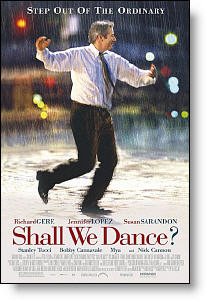
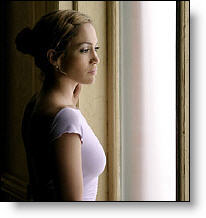
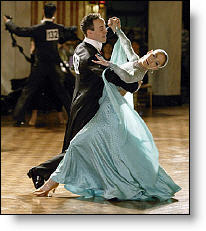
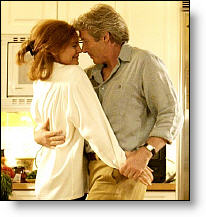
| Featuring |
|---|
| Jennifer Lopez, Richard Gere, Susan Sarandon, Stanley Tucci, Bobby Cannavale |
| Director |
|
Peter Chelsom |
| Producer |
| Simon Fields |
| Distributor |
“Step out of the ordinary”
Creation was made to understand the spiritual. God has placed within each heart the understanding of His grace in motion and His voice within music. No matter what language we speak, we all understand the message within the harmony of the musical form and the elegance of movement within the waltz. For decades the cinematic audience has connected with this form of universal communication. “Shall We Dance” stirs within it the heart, energy and romance of those musical films gone by. Although not a musical and still not completely a dance film, it embodies those qualities and delivers something much more.
A remake of the 1996 Japanese film written and directed by Masayuki Suo, this westernized version of “Shall We Dance?” strongly caters to American audiences. I was very impressed with Jennifer Lopez. She is definitely in her realm and has nailed her character dead on. Some may say Richard Gere is too handsome and confident, Susan Sarandon too beautiful and sophisticated, but this film isn’t observing the outward appearance of the characters portrayed. It is surveying the inner spirit of human plights and how we relate to them. I felt it was done very well and so did the completely enthralled audience. When asked, one movie-goer said enthusiastically, “It had beautiful music and thrilling dance sequences, no violence, no naked sex scenes and a happy ending. These days we need more movies like this!”
John Clark (an ever impressive Richard Gere) has been working for the same Chicago law firm, helping people put together their last wills for their endeared family’s future, for 20 years. He loves his job, his active wife, his two teenage kids, and his life in general, yet he feels something is missing. John follows the same routine day by day—assisting others put their lives in order, riding the “L” home each day, enjoying his typical teenage kids’ self absorbed antics, and connecting with his loving, independent wife Beverly (a radiant Susan Sarandon). He has been contemplating lately the phrase each of his clients utter at the conclusion of their estate planning: “Is that it then?” To each he gives this piece of wisdom in response: “The rest is up to you.” John feels he needs to heed his own advice.
John passes the same dance school each evening, and its neon sign and pensive young dance instructor somehow calls to him. One evening he decides to act upon his urge and go completely against character. He gets off the “L” and enters Miss Mitzi’s School of Dance not really knowing why he’s there. His intrinsic need is fulfilled by signing up for ball room dance lessons taught by Miss Mitzi herself (a lovely, sensitive Anita Gillette).
Friends are quickly forged with two other guys who are there for completely different reasons. The portly Vern (done with quiet sincerity by Omar Benson Miller) is there to loose weight for his wedding in the fall and Chic (Bobby Cannavale who plays a delightful off-the-mark macho character) wants to get the girls. Chic foolishly thinks that the ladies believe that dancers are “better in bed.” Even the adventurous and loudly obnoxious Bonnie (played to the hilt by Lisa Ann Walter) becomes a supportive pal. Although the mysterious and beautiful dance instructor Paulina (a graceful and wonderfully tormented performance by Jennifer Lopez) catches the eye of every male in the studio, they all know she is quietly off limits. Everyone sees she is gliding dreamily through the motions of life only becoming alive when she speaks of or participates in the dance.
Ultimately, as the lessons progress from week to week, John finds he’s having fun, building confidence, and making friends with people he would otherwise never have the pleasure of fraternizing with. He even finds that one of his colleagues from work, Link (an energetic, totally polished Stanley Tucci), attends the same dance studio. Link makes him swear to protect knowledge of his secret ball room dancing from their fellow co-workers for fear they would ridicule him unmercifully. (He’s right, by the way, as we see later as the story progresses). Link relates the seriousness of dance and encourages John to practice more. He says it’s a ratio of five to one: “…five hours of practice to every one hour of class.”
Meanwhile John’s wife and daughter begin to notice a change in him. His daughter mentions he seems happier and when she sees him dancing by himself in the den, she states “Dad is acting weird!” Because a girlfriend at work is in this painful situation, Beverly starts to entertain the notion that John might be having an affair as well. Beverly cannot fathom what would make him act the way he’s been acting lately except for a fling, but yet her heart tells her he isn’t capable of such a thing.
Acting upon her female need to know, Beverly gives into her suspicions and hires a private detective (played with perfect tongue-in-cheek by Richard Jenkins) who well represents the assuming-the-worst in all of us. He finds, to his amazement, that John is actually taking dancing lessons and that there is no “other woman.” Beverly is totally dumbfounded that John would keep this innocent excursion a secret and at the same time is hurt that he wouldn’t include her in his endeavor. Mr. Private Eye tries to console by exclaiming, “…well, at least he’s dancing and not checking into hotel rooms!”
Miss Mitzi is so encouraged by the confident change in her students that she enrolls them in the prestigious Chicago Crystal Ball Dance Competition. Paulina is a dedicated and impassioned instructor to all and Jennifer Lopez’s dance numbers are elegant and beautiful. As the weeks up to the competition get closer, John is home later in the evenings, but Beverly never lets him know she is aware of his activities. When questioned by the detective as to why she is allowing him to continue without letting John know, Beverly lovingly relates she understands John’s needs and because she loves him will let him continue for his own good. There is a beautifully poignant speech on the commitment of love, sacrifice, and understanding between a husband and wife by Susan Sarandon’s character here which must not be missed! Within its context, she sweetly notes that in a marriage you are promising to go unnoticed by anyone except your mate and that each person within that union is a witness all your life to your whole life. There is great love along with true confidentiality given by both to respect and honor one another in unconditional love.
The characters of Paulina and John become close, but not for the reasons other films would personify. Their attraction is not necessarily to each other’s sexuality (as was considered at the onset of the movie), but of a need to reach out and help another human being who is hurting and unsure of where life may be taking them. All the friendships within this story are well rounded and display the uplifting theme that we all rely upon one another, no matter what walk of life or situation we are in.
The evening before the competition Paulina gives a last one hour lesson to John, and upon its completion she realizes he has allowed her to release the painful emotions that have been stifling her needs to express herself through her one true love—the dance. Paulina has finally come to terms with her past defeats and because of John’s plight, finds she is now ready to dance in competition once again.
The night of the Crystal Competition, unknown to him, John’s wife and daughter are in the audience. They are astounded at John’s extraordinary talent. In her enthusiasm John’s daughter cheers uproariously for him. When he realizes they are in the audience, he falters and disqualifies not only himself, but Bonnie from the competition. Knowing how much this competition meant to Bonnie and sure that he has not only let down his family, but all his new found friends, John doesn’t go back to the dance studio.
Bonnie and Link try to console him, but John is just too despondent to return. They tell him that Paulina has decided to go back to England and compete in the dance competition she lost before. They are having a going away party for her, and he is invited, but because of his feelings of failure to those who love him most, he decides against attending. He confides to Beverly that he was always so proud that they were so happy, that she was happy with him. He laments “I was ashamed of wanting to be happier. I never wanted to hurt the one person I treasured most.” In an act of unselfishness Beverly convinces John to go, and in a beautiful final scene of tender devotion to his wife John goes to great romantic lengths to display his love for Beverly, insists she go with him to the party even when she exclaims her dancing is no where near his expertise “I couldn’t possibly be your partner.” John’s final words to her are delightfully clear “To dance I need a partner, and my partner is right here!”
The PG-13 rating is one I nearly always feel is stretched a bit too thin. Because of adult themes, this film is over the heads of pre-teens and is more suitable to young adults. It was a relief to note this movie is about something more than physical attraction. Just because there are no sex scenes or violence, however, does not mean adult sexual themes are not explored. The foul language, although sparse, is there and should be noted: (4) “A**” uttered by Bonnie’s character, (1) “He**” (1) “Pi**” and (1) uncalled for utterance of the F-word. Unfortunately, too, the Lord’s name is taken in vain once.
One character drinks a bit. Bonnie’s character refers to her derrière more than once. Link’s character exclaims “they will crucify me if they find out.” I was disappointed in the way the character of Chic was portrayed as being actually “gay” in the end sequence and in assuming that is an acceptable life style. Although the dance sequences are just wonderful and the actors who can dance is a surprise, the one hour dance between Paulina and John could be taken as a play on them having sex or an affair, although the actual characters were never unfaithful. When asked by John about who her most perfect partner was Miss Mitzi tenderly says her perfect partner was her husband. On the whole though “Shall We Dance” strongly promotes the spiritual themes of mature married love, self control, trust and the true meaning of friendships. The comedy is perfect. The serious moments are gems.
A prayer by Emerson conveys the beauty of friendships well. He notes:
“I awoke this morning with a devout thanksgiving for my friends,
The old and the new. Shall I not call God the beautiful,
who daily showeth Himself to me His gifts?”
A marriage is built upon love and respect. I feel this film well displays this wonderful theme. When love and respect flow through a marriage, it changes the way couples talk to and treat each other. Ephesians 5:33 gives this message of Biblical respect, “Nevertheless let every one of you in particular so love his wife even as himself; and the wife see that she reverence her husband.” Don’t give up on each other, because you never know when someone’s heart will turn around.
The themes running throughout “Shall We Dance” are: the overwhelming capacity to love even when you might not understand your partner’s reasons for doing things—trusting in love within the relationship—and keeping communications open. When forced to deal with a questionable attitude or situation, the wife gave plenty of reasons she believed in her husband and his needs, while still enjoying his company. She showed great confidence in their future because of their past. The wife portrayed beautifully her identification with her husband’s pain and never found fault in his actions. She discovered how to cooperate rather than compete. John asked for forgiveness and was humble enough to admit he was wrong not to let his wife know of his desire to get more out of his life. Beverly allowed John to forgive himself by understanding the results of her husband’s actions. John set boundaries and didn’t allow his needs to adversely affect his marriage. Although God was not mentioned, His compassion and understanding was displayed through these characters. They aimed at restoration. James 1:5 says we should ask God for wisdom to handle life’s trials “…he should ask God, who gives generously to all without finding fault, and it will be given to him.”
John proved that honesty and self control are the highlights of exemplary character. When a spouse finds that their partner hasn’t confided innermost fears or pain, the price to be paid may be high. Dishonesty often dooms relationships. Once a person’s problems, pain or fear has been brought out in the open God is allowed to come into the midst and begin the process of healing.
John also shined as an example of self control. Proverbs 14:6 says “A wise man feareth, and departeth from evil.” Psalm 37:31 notes “The law of God is in his heart, none of his steps shall slide.” As a compliment to John’s character Beverly personified wisdom and trust. Proverbs 16:20 leads our understanding by stating “He that handleth a matter wisely shall find good.”
God meant for marriage to be a covenant of passion, forgiveness, and honesty. Give thanks even in the hard things. Be grateful for the partner your God has given you. Be thankful God is always faithful even when a situation isn’t easy to understand. We must have the faith and trust to know He will use it to make us stronger. Even though these characters used music and dance to convey comfort, the spiritual elements of God’s promise of comfort rings clear. 2 Corinthians 1:3-4 says “Praise be to God… who comforts us in all our troubles, so that we can comfort those in any trouble with the comfort we ourselves have received from God.”
Life has seasons. Life’s choices have costs. Life’s seasons sometimes take us far away from one another. Allow the force of love’s gravity to pull you back. The union of marriage between a man and a woman is a real and living thing. It is the unseen identity that flows between man and wife. Sometimes the options are tough and confusing. Let us be thankful to God we are fortunate enough to have His blessing and guidance through His Word and example.
Lastly, let us be in awe that He is The Lord of The Dance. He is the heartbeat of all life. In the words and music of Steven Curtis Chapman, let us rejoice and dance before The Lord:
“The world beneath us spins in circles
And this life makes us twist and turn and sway
But we were made more than rhythm with no reason
By The One who moves with passion and with grace
As He dances over all that He has made.”
Violence: None / Profanity: Mild / Sex/Nudity: Mild
See our review of the original Japanese of this film: “Shall We Dance?”


[Better than Average/4]
[Good/5]
[Excellent!/5]
[Average/3]
[Offensive/4]
Please men, don’t think that this is a sweet movie that touches your soul. And please women, don’t think it is an educational movie on how to deal with your husband’s hidden desires. I can’t believe how many people were fooled by this movie to thinking it was OK just because it was mild in other issues! Adultery is adultery, even in the heart. How would you feel if you found out that your spouse was sneaking off to be pressed up against a hot instructor night after night?
I know from first-hand experience that there are deeper issues that need help in your marriage if you or your spouse thought that the behavior in this movie was acceptable …you’re playing with fire, and will eventually get burned. You don’t have to be a Christian or believe in Godly principals to use your common sense in a matter like this.
Moral rating: Very Offensive / Moviemaking quality: 3½
[Good/4½]
[Better than Average/3½]
[Better than Average/4]
[Good/4½]
[Better than Average/4]
[Average/3½]
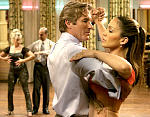


My Ratings: [Better than Average/4½]